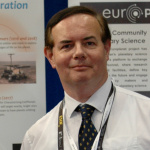The Last Word: A Strategic Opportunity
Nigel Mason, President of the Europlanet Society, highlights opportunities to shape the future of Space Research Infrastructures in Europe.
Read article in the fully formatted PDF of the Europlanet Magazine.
There are currently two ongoing key strategic discussions that should be of particular interest to the Europlanet community. The European Space Agency (ESA) is preparing for the Ministerial Council meeting in Paris in November 2022, where decisions will be made on its strategy and budget for the next three years. At the European Commission, work programmes for Horizon Europe funding calls in 2023-2024 are being developed, informed by input from the European Strategy Forum on Research Infrastructures (ESFRI).
While the ESA strategy and the ESFRI discussions are taking place in parallel, there are clear overlaps in European resources and scientific goals that are relevant to planetary science. The concept and methodology of a Research Infrastructure (RI) is largely unique to European science. The ESFRI Roadmap 2021 provides a vision to deliver cutting-edge research in six domains that range from ‘Health and Food’ to ‘Social and Cultural Innovation’. ESFRI’s Physical Sciences and Engineering (PSE) domain supports RIs that address fundamental questions for the progress of human knowledge, including the origin of the Universe, the conditions for life, and the nature of dark matter and dark energy.
Scientific challenges identified within the PSE domain include understanding the formation of stars and planets, the search for planetary systems, studies of the Solar System and extrasolar planets, the search for life, and understanding the conditions enabling life. These scientific questions are not only of immense interest to scientists and the public, but are also central to the ESA strategy review. It is, therefore, important to ensure that there is good communication between ESA and ESFRI, and here Europlanet can provide a bridge to facilitate alignment between the two strategies.
The launch of the ESFRI Stakeholders Forum in March suggests that there is a new willingness and awareness by ESFRI of a need to engage with a broad community of scientists and stakeholders. Historically, ESFRI has had a structural bias towards ‘top down’ large-scale infrastructures like the Extremely Large Telescope (ELT) or the Square Kilometre Array Organisation (SKAO). As a result, the ‘bottom up’ distributed research infrastructures (like Europlanet), which coordinate access to a more flexible range of laboratory and field site facilities and services, have been under-represented within successive ESFRI Roadmaps. To help build a stronger voice, Europlanet has taken a lead in co-convening a workshop for distributed RIs in 2021 and is planning follow-up meetings in 2022 and 2023.
The ESFRI Roadmap and Horizon Europe programme both emphasise that European RIs are evolving towards a consolidated ecosystem, where the priority is on upgrading and clustering existing RIs rather than creating new ones. In looking to Europlanet’s future, we believe this means broadening our community’s remit to be inclusive of astrochemistry, astrobiology and origins of life on Earth. To engage fully with ESA’s emerging Science in the Space Environment (SciSpacE) programme, we also need to include lunar studies and the exploitation (as well as exploration) of space, which means embracing the Space 4.0 concept and closer ties to industry.
Overall, by mobilising our community to proactively engage with ESFRI and ESA at this critical time, Europlanet has a unique opportunity to showcase the vital role that distributed RIs play in the research landscape, particularly in curiosity-driven research.
Prof Nigel Mason, OBE, is Professor of Molecular Physics, President of the Europlanet Society and Coordinator of the Europlanet 2024 Research Infrastructure



